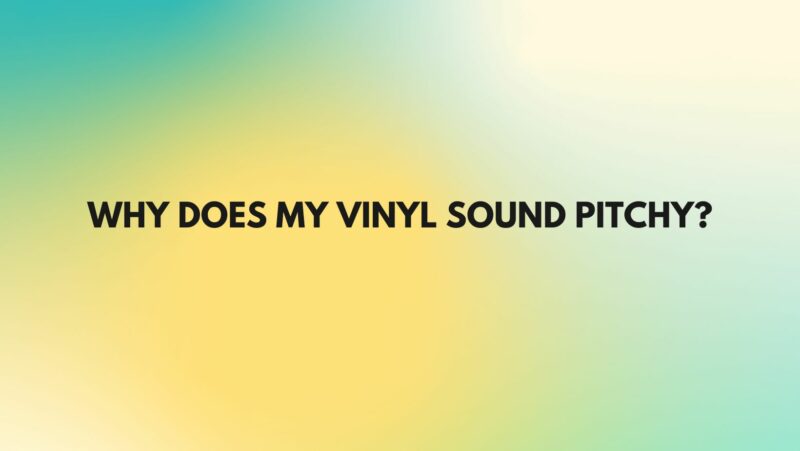There are a few reasons why your vinyl might sound pitchy:
- Incorrect speed: If the record player is spinning too fast or too slow, the music will sound pitchy. This can be caused by a worn or damaged belt, or by a problem with the motor.
- Misaligned cartridge: If the cartridge is not aligned correctly, the stylus will not track the record groove correctly. This can cause the music to sound distorted or pitchy.
- Worn or damaged stylus: A worn or damaged stylus can also cause the music to sound distorted or pitchy.
- Problems with the speakers: If the speakers are not working properly, they can cause the music to sound distorted or pitchy.
- Warped record: A warped record will not lie flat on the turntable, which can cause the stylus to skip or skate across the record. This can cause the music to sound pitchy.
- Dirty record: A dirty record can cause the stylus to skip or skate across the record, which can cause the music to sound pitchy.
- Problems with the turntable itself: In some cases, problems with the turntable itself, such as a faulty speed control or a loose platter, can cause the music to sound pitchy.
To troubleshoot why your vinyl is sounding pitchy, you can try the following:
- Check the speed: Make sure that the record player is set to the correct speed for the record you are playing. You can use a strobe disc to verify that the platter is spinning at the correct speed.
- Align the cartridge: If the cartridge is not aligned correctly, you can use a cartridge alignment tool to align it.
- Inspect the stylus: If the stylus is worn or damaged, it will need to be replaced.
- Check the speakers: Make sure that the speakers are working properly and that they are connected to the record player correctly.
- Check the record: If the record is warped or dirty, clean it or replace it.
- Have the turntable serviced: If you have tried all of the above and your vinyl is still sounding pitchy, it is possible that there is a problem with the turntable itself. In this case, it is a good idea to have the turntable looked at by a qualified technician.
Here are some additional tips for keeping your vinyl and turntable in good condition:
- Store your vinyl in a cool, dry place.
- Clean your records regularly with a record brush or cleaning solution.
- Avoid touching the stylus with your fingers.
- Use a high-quality record brush to clean your records before playing them.
- Have your turntable serviced regularly by a qualified technician.
By following these tips, you can help to ensure that your vinyl and turntable stay in good condition and that you can enjoy your music for many years to come.
In addition to the above, here are some other things to keep in mind:
- Different vinyl records may have different pitch characteristics. Some records are simply pressed at a higher or lower pitch than others. This is not necessarily a defect, but it can be noticeable if you are used to hearing a particular record played at a certain pitch.
- Your record player may not be calibrated perfectly. Even if your record player is set to the correct speed, it may not be spinning at the exact speed it is supposed to be. This can cause a slight change in pitch.
- Your hearing may be playing a role. Our hearing can change over time, and we may become more sensitive to certain pitches. This can make it seem like your records are sounding pitchy, even if they are not.
If you are concerned about the pitch of your vinyl records, you can try the following:
- Compare different records. Play a few different records and see if you notice any differences in pitch. If all of your records sound pitchy, then the problem is likely with your record player or your hearing.
- Have your record player calibrated. A qualified technician can calibrate your record player to ensure that it is spinning at the correct speed.
- Get your hearing checked. If you are concerned about your hearing, it is a good idea to get it checked by a doctor or audiologist.
By following these tips, you can help to ensure that you are getting the best possible sound out of your vinyl records.


